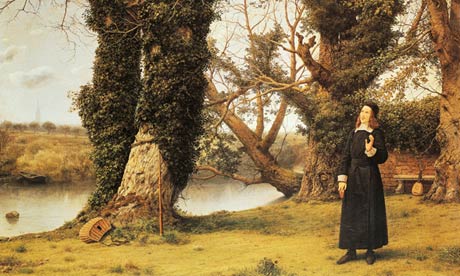Tags

I struck the board, and cried, “No more;
I will abroad!
What? shall I ever sigh and pine?
My lines and life are free, free as the road,
Loose as the wind, as large as store.
Shall I be still in suit?
Have I no harvest but a thorn
To let me blood, and not restore
What I have lost with cordial fruit?
So begins George Herbert’s poem, The Collar. Herbert loved playing with words, it’s one reason I love his poetry. At first sight the subject seems to refer to the limiting effects of a collar, most obviously, his clerical collar, but of course the word is, in its sound, similar to the word “choler”, or “anger”, as well as to the word “caller”.
According to the theories of early modern medicine, “choler” was the humour which made one angry, hence our word “choleric”, and this poem has that in abundance.
He begins with anger expressing itself in physical form. The “board” he strikes may be taken to be a table, but it could equally be the altar, and given the subject of the poem, that may be the preferred reading. Herbert’s patience is at and end, he’s leaving. The constant search for something he cannot have is, he declares, at an end. He’s telling God that that’s it! He wants to be “free as the road.” We might note in passing the echo of the “rood” or Christ’s cross, whose sacrifices the poet is now rejecting. He wants a secular life and its happiness.
“Shall I still be in suit?” he asks querulously. This is almost a tantrum. He feels he has no control, that he is always the petitioner; he wants freedom. All he feels he has is a thorn, and we hear the echo, again, of Christ’s crucifixion when he was crowned with thorns.
Sure there was wine
Before my sighs did dry it; there was corn
Before my tears did drown it.
Is the year only lost to me?
Have I no bays to crown it,
No flowers, no garlands gay? All blasted?
All wasted?
Not so, my heart; but there is fruit,
And thou hast hands.
Of all Herbert’s poems, this is the one closest to modern free verse. He eschews his usual style, and the poem sprawls across the page, as ill-disciplined as the poet’s temper. He looks back with anger at what was, and longs for something better. Then it occurs to him that there is still time to do so.
Recover all thy sigh-blown age
On double pleasures: leave thy cold dispute
Of what is fit and not. Forsake thy cage,
Thy rope of sands,
Which petty thoughts have made, and made to thee
Good cable, to enforce and draw,
And be thy law,
While thou didst wink and wouldst not see.
Away! take heed;
I will abroad.
He can reject the academic life and the discipline of theology and of God. The constraints on him are, after all, self-imposed, and he can, if he so pleases, loosen them and leave.
And so, as the poem itself rages on with the poet’s wrath, another voice, a still small one is heard off-scene.
Call in thy death’s-head there; tie up thy fears;
He that forbears
To suit and serve his need
Deserves his load.”
But as I raved and grew more fierce and wild
At every word,
Methought I heard one calling, Child!
And I replied My Lord.
And in response to the “caller” Herbert’s “choler” subsides. Yes, it is his choice to follow Christ, and despite his anger and his hurt, he will do so. However much his human will rebels against God, the poet knows he cannot live without him, and when God calls the poet, like Samuel, may wonder “Is it I, Lord?” But he knows that, like Samuel, he will follow.
In many ways this is one of the most personal of Herbert’s poems, and for me, and I know others, one of the most reassuring. If a man like Herbert could so rail against God, then is it suprising that the rest of us have done so from time to time and wondered whether we could carry on living a Godly life in the face of temptation, not least the temptations of our own wilfulness. But for me, as for the poet, when I hear “the caller” I, too, reply “My Lord.”





You must be logged in to post a comment.